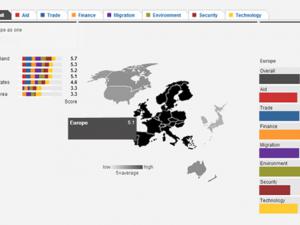Owen Barder, Senior Fellow and Director for Europe, at the The Center for Global Development attended the session Europe Beyond Aid at the recent European Development Days to present the Commitment to Development Index and to address the question: "do European policies reflect its commitment to development?" In the following interview he examines this question, concluding with what he would like to see changed in the post-2015 development agenda.
Question: What is the Commitment to Development Index?

Owen Barder
Owen Barder: The Commitment to Development Index is something that the Center for Global Development has been calculating for 11 years now. It’s an effort to rank 27 of the world’s richest countries according to whether their policies are supportive of development, poverty reduction, prosperity, and reductions in inequalities in poor countries. We look at seven different dimensions of how these countries’ policies affect the developing world. These are aid, trade, technology transfer, investment, migration, security and the environment.
Within each of these dimensions we look at whether their policies are generally supportive of poverty reduction or generally make it more difficult. For example we look at indicators of whether a country has restrictive intellectual property rights that make it difficult for technology to transfer from rich countries to poor countries; or how rich countries affect the environment: are they contributing to greenhouse gas emissions; are they contributing to reductions in bio-diversity?
Question: What lessons can we learn from the Commitment to Development Index?
There are three main lessons:
- We talk a lot about aid and neglect non-aid areas
- In these other areas, many countries including Europe are not doing as well as they could. For example, Europe is development-friendly but focuses more on the symptoms of poverty than on the causes.
- When we look in detail at the index, some countries do well in certain areas and others badly in others.

Best and Worst Peformers
We need to look at what are the lessons that we can learn from the countries that do it well and how the rest of us could emulate those successes and change our own policy environments.
You can find out more about the lessons learned and hear about examples of results from Norway, Sweden, South Korea and the UK in the video above.
Question: What are the key findings?
We’ve been producing the index now for 11 years, and there are two interesting findings from the point of view of being here at the European Development Days. One is that over the 11 years the results haven’t got much better. We had the Monterrey Consensus in 2002, we had the Gleneagles Summit in 2005, we had Busan, all saying that we need a broader form of development cooperation. But when we look at the actual results, what we find is that really only in one area has there been significant improvement.
And that one area is a part of our environment component. We’ve seen a reduction in emissions of gases that tend to damage the ozone layer, because there was an agreement in Montreal called the Montreal Protocol, where we signed up to binding targets to reduce the emissions of those gasses. In most of the other components there’s really been no change at all. Things like trade and migration have stayed roughly flat.
The area where we’ve seen the most deterioration is in security. Countries are committing less to peacekeeping and the security of the sea lanes, while they’re increasing their sale of arms to poor and undemocratic countries. So our index is tracking not much overall change: some improvement in the environment and some deterioration in security.
What we also found is that European countries which tend to think of themselves as generally progressive on development don’t come out especially well overall. They have very good aid policies, and come top of the aid index but they don’t have particularly good policies in the other six dimensions. So Europe comes out a little bit ahead of the United States, Japan and South Korea, but behind Canada, Australia and New Zealand. And again European policies haven’t improved significantly over the 11 years that we’ve been measuring the index.

Results (Europe as one)
Question: Do you have any recommendations for aid/development actors?
We have to move away from thinking about rich countries giving aid to poor countries as the primary mechanism by which development can be accelerated. More and more the challenges we face are common challenges. How do we ensure that we don’t overfish the seas? How do we ensure that we don’t between us emit too many greenhouse gases that lead to worse climate change? How do we protect the financial system and ensure that it’s more stable? How do we stop countries from preventing food exports when there’s a bad harvest one year and so driving up the prices for everybody else? These are common challenges that we need to address together in all our interests.
And so we need to think about how our own governments and our own decision makers don’t just leave the development issues to an aid ministry, or DEVCO in the case of the European Commission. How do we ensure that the paths of our governments, or the paths of the Commission, that are thinking about trade, the environment, corruption, and tax, are all doing so in ways that benefit not only our own countries but the global community more generally? How can these policies be shaped so that they promote prosperity, reductions in inequality and in poverty?
This means more than just the development people trying to insert a development idea into a trade negotiation. It really means our governments more generally taking on the idea that these are shared projects, common interests that we work on together. In my experience in most governments the people working in these areas, the ministers and the civil servants, do actually care about our shared world. But they don’t have the evidence and the analysis that enables them to identify what these issues are, where they need to do a better job on these issues. So they tend to run on the same railway track that they’ve always run on.
I think there’s a big challenge for us in the development community to identify the priorities and to bring the evidence, the analysis, and these issues to the table and to make sure that we’re thinking about them when we think about our migration, trade, environment and security policies. Because if we don’t do that, then we’re not really going to make any progress on these shared challenges.
Question: What would you like to see addressed in the Post-2015 debate?
The part of the post 2015 debate that’s missing in the conversation at the moment is really tracking and measuring the commitments of wealthy countries and powerful institutions for their contributions to the post 2015 framework.
We’re very good at setting targets for developing countries, but we’re not very good at setting and accepting targets and measuring progress for the wealthy countries. The Commitment to Development Index is an attempt to be a comprehensive evidence-based quantitative framework for assessing wealthy countries and it shows is that we’ve made very little progress except in the one area where we had a legally binding quantified commitment state by state. We’ve made great progress on reducing ozone harming emissions.
So it makes me wonder what more we could achieve if we were to set quantified country by country targets for making improvements in all these areas. It seems to me that unless we do that it’s very unlikely that the post 2015 framework will really demand of wealthy nations proper commitments to change their policies and behaviour in a way that’s really important if we’re going to tackle these shared problems together.
Listen to a recorded version of the session Europe Beyond Aid at the European Development Days.
For more information on the Commitment to Development Index please visit the website.
Images are copyright of the The Center for Global Development.

Log in with your EU Login account to post or comment on the platform.